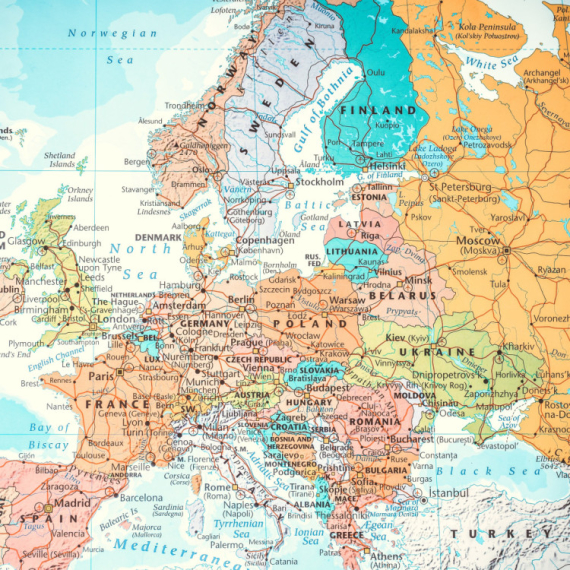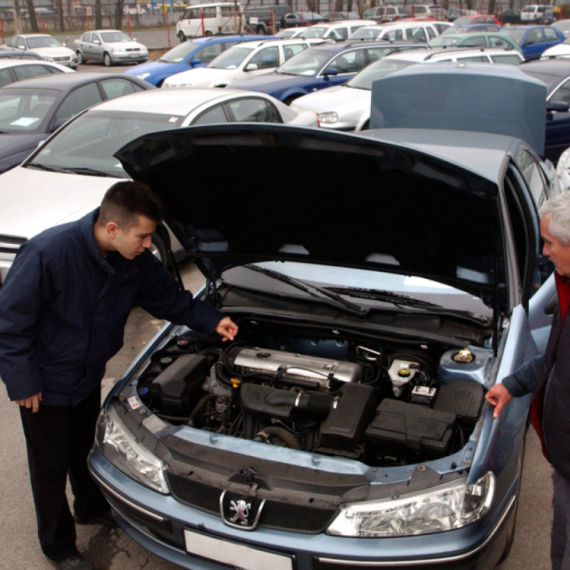Telekom sale "not in Serbia's best interest"
Anti-Corruption Council President Verica Barać says the coming sale of Telekom Srbija is not transparent and does not serve the best interests of Serbia.
Thursday, 11.11.2010.
09:46

Anti-Corruption Council President Verica Barac says the coming sale of Telekom Srbija is not transparent and does not serve the best interests of Serbia. At a press conference, Barac told reporters that the government has not replied to a letter which the Anti-Corruption Council sent several month ago, in which it requested that the decision on the sale be made public and that the relevant ministry provides an explanation for proposing the sale of the state-owned telecommunications company. Telekom sale "not in Serbia's best interest" People should know what the government is selling and what the sale of 51 percent of Telekom shares means, Barac said and pointed out that telecommunication infrastructure cannot be sold. The telecommunication infrastructure is not for sale and this point is regulated by the Law on Privatization and Law on Concessions, Barac noted and added that the sale of telecommunication infrastructure may also pose a risk for the future buyer. “If the government sells Telekom Srbija, it is selling the monopoly and the market, the mechanism that can protect every citizen in Serbia,” Barac pointed out and assessed that the sale can be prevented only by extreme pressure of the public and the media. “Through the sale of Telekom, the state will lose control over revenues of about EUR 1 million, and the budget will be deprived of about EUR 200 million, which is the amount of the company's annual profit,” former telecommunications minister Aleksandra Smiljanic said. She said that such a sale and loss of money serve somebody's personal interests rather than the citizens' interests, and qualified it as abuse of office and corruption. Barac also stated on Wednesday that the annual report of the European Commission (EC) clearly indicates that corruption is one of the main obstacles to the Serbia's internal order and the country's EU path. In a statement for Tanjug, Barac said that the EC report contains assessments of the progress the country has made so far, but that it also includes guidelines for a long-term construction of the institutional system, which unfortunately has not yet begun in Serbia. “Serbia is adopting laws that are part of political party bargaining, and then institutions composed of party members are constituted on the basis of bad and non-harmonized regulations, which are operated by the government although they should be independent,” Barac said. She said that the Board for Deciding on Conflicts of Interests and the Anti-Monopoly Commission are examples of institutions controlled by the government, which were were later disbanded. “The law did not give the appropriate authority to these institutions and that is why they did not achieve results, which made it easy for the government to describe them as useless and disband them,” Barac added. She underscored that the inadequate judiciary reform is one of the main obstacles to Serbia's progress on its EU path. “This was not a genuine judiciary reform, but a party purge in the judicial domain, which was conducted with the help of parties and secret police,” Barac said and added that it represented a gross interference in the independence of the judiciary. Barac underscored that judiciary reform cannot be carried out by executive authorities, and added that the judiciary has to fight for its rights and authority. Verica Barac (Beta)
Telekom sale "not in Serbia's best interest"
People should know what the government is selling and what the sale of 51 percent of Telekom shares means, Barać said and pointed out that telecommunication infrastructure cannot be sold.The telecommunication infrastructure is not for sale and this point is regulated by the Law on Privatization and Law on Concessions, Barać noted and added that the sale of telecommunication infrastructure may also pose a risk for the future buyer.
“If the government sells Telekom Srbija, it is selling the monopoly and the market, the mechanism that can protect every citizen in Serbia,” Barać pointed out and assessed that the sale can be prevented only by extreme pressure of the public and the media.
“Through the sale of Telekom, the state will lose control over revenues of about EUR 1 million, and the budget will be deprived of about EUR 200 million, which is the amount of the company's annual profit,” former telecommunications minister Aleksandra Smiljanić said.
She said that such a sale and loss of money serve somebody's personal interests rather than the citizens' interests, and qualified it as abuse of office and corruption.
Barać also stated on Wednesday that the annual report of the European Commission (EC) clearly indicates that corruption is one of the main obstacles to the Serbia's internal order and the country's EU path.
In a statement for Tanjug, Barać said that the EC report contains assessments of the progress the country has made so far, but that it also includes guidelines for a long-term construction of the institutional system, which unfortunately has not yet begun in Serbia.
“Serbia is adopting laws that are part of political party bargaining, and then institutions composed of party members are constituted on the basis of bad and non-harmonized regulations, which are operated by the government although they should be independent,” Barać said.
She said that the Board for Deciding on Conflicts of Interests and the Anti-Monopoly Commission are examples of institutions controlled by the government, which were were later disbanded.
“The law did not give the appropriate authority to these institutions and that is why they did not achieve results, which made it easy for the government to describe them as useless and disband them,” Barać added.
She underscored that the inadequate judiciary reform is one of the main obstacles to Serbia's progress on its EU path.
“This was not a genuine judiciary reform, but a party purge in the judicial domain, which was conducted with the help of parties and secret police,” Barać said and added that it represented a gross interference in the independence of the judiciary.
Barać underscored that judiciary reform cannot be carried out by executive authorities, and added that the judiciary has to fight for its rights and authority.



























































Komentari 6
Pogledaj komentare